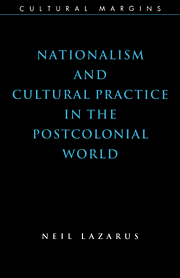Book contents
- Frontmatter
- Contents
- Acknowledgments
- Introduction: hating tradition properly
- 1 Modernity, globalization, and the “West”
- 2 Disavowing decolonization: nationalism, intellectuals, and the question of representation in postcolonial theory
- 3 Cricket, modernism, national culture: the case of C. L. R. James
- 4 “Unsystematic fingers at the conditions of the times”: Af ropop and the paradoxes of imperialism
- Notes
- Bibliography
- Index
- Cultural Margins
4 - “Unsystematic fingers at the conditions of the times”: Af ropop and the paradoxes of imperialism
Published online by Cambridge University Press: 02 December 2009
- Frontmatter
- Contents
- Acknowledgments
- Introduction: hating tradition properly
- 1 Modernity, globalization, and the “West”
- 2 Disavowing decolonization: nationalism, intellectuals, and the question of representation in postcolonial theory
- 3 Cricket, modernism, national culture: the case of C. L. R. James
- 4 “Unsystematic fingers at the conditions of the times”: Af ropop and the paradoxes of imperialism
- Notes
- Bibliography
- Index
- Cultural Margins
Summary
I would like to begin this chapter, on contemporary African pop music, by referring to a scene from The Healers, a novel by the Ghanaian writer, Ayi Kwei Armah. Published in 1979, The Healers offers a perspective on the collapse of Ashanti military power and the formal institution of British colonial rule in Ghana in the 1870s. The novel's final pages describe an official ceremony, as the ranks of the British forces against the Ashanti, composed overwhelmingly of African conscripts drawn from the entire region of West Africa, are marshaled to attend the departure for England of the all-conquering British general, Wolseley. Here is how the novel ends:
West Indian soldiers had come with [Wolseley] to the bay, with their guns and musical instruments … [They] played solemn music to send the white general off. But once the ship had disappeared, their playing changed. The stiff, straight, graceless beats of white music vanished. Instead, there was a new, skilful, strangely happy interweaving of rhythms, and instead of marching back through the streets the soldiers danced. Others joined them … All the groups gathered by the whites to come and fight for them were there and they all danced … a grotesque, variegated crowd they made, snaking its way through the town …
“It's the new dance,” Ajoa said, shaking her head. She spoke sadly, and her sadness was merely a reflection of the sadness of [the other healers] … as they watched. […]
- Type
- Chapter
- Information
- Nationalism and Cultural Practice in the Postcolonial World , pp. 196 - 225Publisher: Cambridge University PressPrint publication year: 1999

